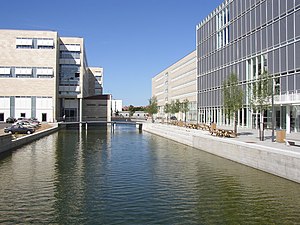The University of Southern Denmark is a university in Denmark that has campuses located in Southern Denmark and on Zealand.

Roskilde University is a Danish public university founded in 1972 and located in Trekroner in the Eastern part of Roskilde. The university awards bachelor's degrees, master's degrees, and Ph.D. degrees in a wide variety of subjects within social sciences, the humanities, and natural sciences.

The University of Copenhagen is a public research university in Copenhagen, Denmark. Founded in 1479, the University of Copenhagen is the second-oldest university in Scandinavia after Uppsala University, and ranks as one of the top universities in the Nordic countries and Europe.
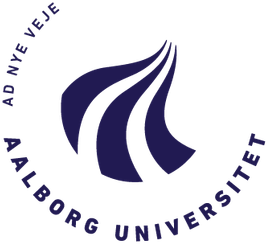
Aalborg University (AAU) is a Danish public university with campuses in Aalborg, Esbjerg, and Copenhagen founded in 1974. The university awards bachelor's degrees, master's degrees, and PhD degrees in a wide variety of subjects within humanities, social sciences, information technology, design, engineering, exact sciences, and medicine.
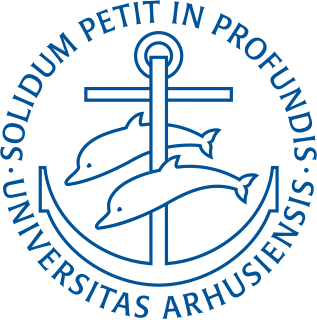
Aarhus University is a public research university located in Aarhus, Denmark. It is the second largest and second oldest university in Denmark. The university belongs to the Coimbra Group, the Guild, and Utrecht Network of European universities and is a member of the European University Association.

The Faculty of Law at the University of Copenhagen has two departments including a number of research centres and prepares students for the Bachelor of Law degree (BA) and the profession degree in Law, cand. jur.. The Faculty runs a special library, known as the Law Laboratory, for students.
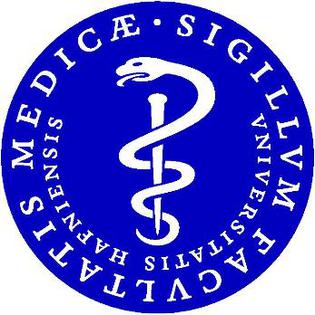
The Faculty of Health and Medical Sciences at the University of Copenhagen houses 13 departments, 29 centres, five schools, four hospitals, and three libraries.
The Arnamagnæan Institute is a teaching and research institute established in 1956 to further the study of the manuscripts in the Arnamagnæan Manuscript Collection, the collection bequeathed by the Icelandic scholar and antiquarian Árni Magnússon to the University of Copenhagen in 1730.

Rigshospitalet is the largest hospital in Denmark and the most highly specialised hospital in the country. The hospital's main building is a 16-storey functionalist highrise, one of the tallest structures in the central parts of the city. Rigshospitalet neighbours the Panum Building which houses the Faculty of Health and Medical Sciences at the University of Copenhagen. As a teaching hospital it is part of the framework organisation Copenhagen University Hospital.
Michael David Fortescue is a British-born linguist specializing in Arctic and native North American languages, including Kalaallisut, Inuktun, Chukchi and Nitinaht. He gained his PhD in Linguistics from the University of Edinburgh in 1978.

Martin Raahauge Borreskov Geertsen is a Danish politician, who is a member of the Folketing for the Venstre political party. He entered parliament in 2018 after Søren Pind resigned his seat. He was previously a member of parliament between 2011 and 2015. He is a former mayor of the Culture Committee in Copenhagen and former political leader of the Venstre party in Copenhagen.
Anja Cetti Andersen is an astronomer and astrophysicist from Hørsholm, Denmark.
Gitte Moos Knudsen is a Danish translational neurobiologist and clinical neurologist, and Clinical Professor and Chief Physician at the Department of Clinical Medicine, Neurology, Psychiatry and Sensory Sciences, at Copenhagen University Hospital. She graduated from Lyngby Statsskole, just north of Copenhagen, before gaining entrance to medicine, where she received her MD from University of Copenhagen in 1984, and became a Board certified user of radioisotopes in 1986. She sat the FMGEMS exam (US) in 1989. She became Board certified in neurology in 1994 and received her DMSc (Dr.Med.) from University of Copenhagen in 1994. She currently resides in Copenhagen, and is married to Tore Vulpius. She has 3 children.
Gretty Mizrahi Mirdal is Emeritus Professor of Psychology at the University of Copenhagen, and was the director of the Paris Institute for Advanced Study from 2012 to 2018.

The South Campus is one of University of Copenhagen's four campuses in Copenhagen, Denmark. It is situated on Amager just south of Njalsgade, between Ørestad Boulevard and Amager Fælledvej, forming the northernmost part of Ørestad. It is home to the Faculty of Humanities which will later be joined by the Faculty of Theology and the Faculty of Law. Once completed, the campus will be home to about 12,000 students and researchers.
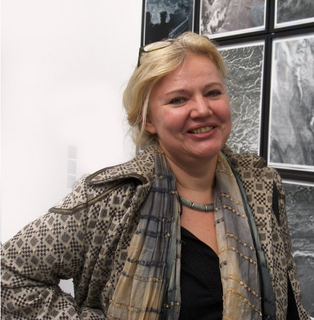
Cathrine Hasse is a professor of cultural anthropology and learning at the University of Aarhus, Denmark. Her research lies in the intersection between culture, learning and technology.

Frederiksberg Campus is one of the four main campuses of University of Copenhagen in Copenhagen, Denmark. It is located in Frederiksberg and is home to large parts of the Faculty of Science' activities within the fields of natural science and biosciences as well as part of the School of Veterinary Medicine and Animal Science at the Faculty of Health and Medical Sciences, including the University Hospital for Companion Animals. The main campus is located on the west side of Bülowsvej, on both sides of Thorvaldsensvej and Rolighedsvej. It occupies the former grounds of the Royal Veterinary and Agricultural University (KVL) which was merged into the University of Copenhagen in 2007. The main building at Bülowsvej No. 17 is from 1895.
Rubina Raja is a classical archaeologist educated at University of Copenhagen (Denmark), La Sapienza University (Rome) and University of Oxford (England). She is professor (chair) of classical archaeology at Aarhus University and centre director of the Danish National Research Foundation's Centre of Excellence for Urban Network Evolutions (UrbNet). She specialises in the cultural, social and religious archaeology and history of past societies. Research foci include urban development and network studies, architecture and urban planning, the materiality of religion as well as iconography from the Hellenistic to Early Medieval periods. Her publications include articles, edited volumes and monographs on historiography, ancient portraiture and urban archaeology as well as themes in the intersecting fields between humanities and natural sciences. Rubina Raja received her DPhil degree from the University of Oxford in 2005 with a thesis on urban development and regional identities in the eastern Roman provinces under the supervision of Professors R.R.R. Smith and Margareta Steinby. Thereafter, she held a post-doctoral position at Hamburg University, Germany, before she in 2007 moved to a second post-doctoral position at Aarhus University, Denmark. In 2011–2016, she was a member of the Young Academy of Denmark, where she was elected chairwoman in 2013.
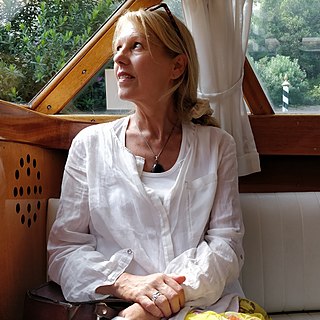
Christiane Timmerman was a Belgian psychologist, anthropologist and migration expert. In 2006 she became the director of the Centre for Migration and Intercultural Studies (CeMIS), an interdisciplinary research centre at the University of Antwerp that conducts research and education relating to migration, social integration and intercultural themes in various social fields, including education, the labour market, welfare, family, health and law. She was also a professor at the Faculty of Social Sciences at the University of Antwerp where she taught courses related to migration and integration.

Karin Margarita Frei is an Argentinean-Danish archaeological scientist. She is a research professor in archaeometry at the National Museum of Denmark in Copenhagen. She has developed new methodologies for using isotopes to trace human and animal mobility, including the high time-resolution tracing technique for human hair and finger nails as well as ancient wool.
